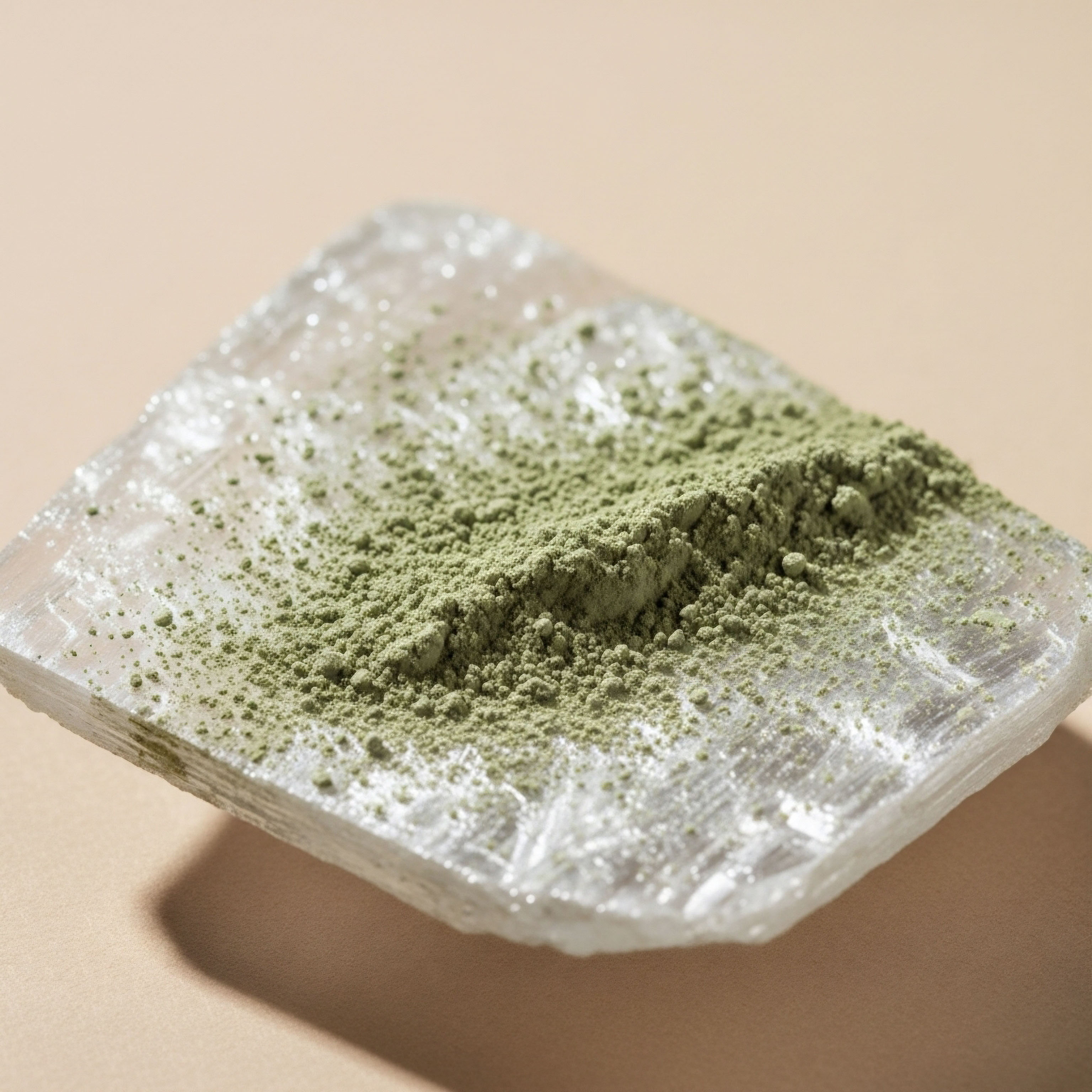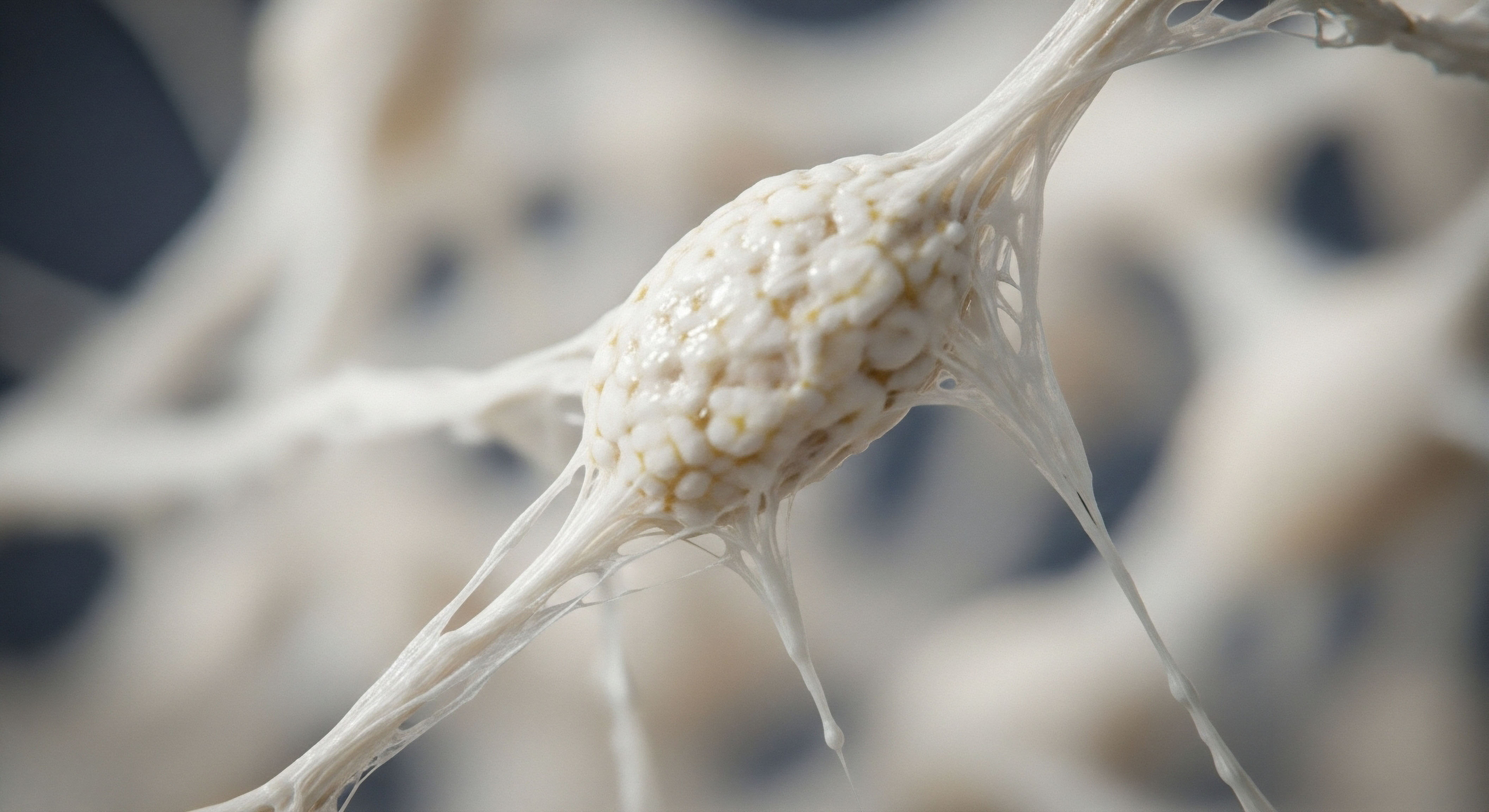

The Endocrine System’s Nocturnal Command
The pursuit of peak human performance often focuses on rigorous training, precise nutrition, and advanced supplementation. A fundamental pillar frequently overlooked, a non-negotiable component of biological supremacy, lies within the quiet hours of the night. Sleep represents a profound hormonal reset.
This vital process extends beyond simple physical rest; it orchestrates complex recalibrations across the entire endocrine system, forging the very chemistry of vitality. Neglecting this nightly command center means operating at a biological deficit, consistently undermining every other effort toward optimization.
Consider the Hypothalamic-Pituitary-Gonadal (HPG) axis, the central regulator of reproductive and anabolic hormones. During deep sleep cycles, particularly slow-wave sleep, the pulsatile release of Gonadotropin-Releasing Hormone (GnRH) intensifies. This, in turn, stimulates the pituitary gland to secrete Luteinizing Hormone (LH) and Follicle-Stimulating Hormone (FSH), which then signal the gonads to produce testosterone in men and regulate ovarian function in women.
Chronic sleep deprivation directly blunts this nocturnal surge, leading to a measurable decline in endogenous testosterone production. Studies consistently demonstrate that even a single week of restricted sleep (five hours per night) can reduce testosterone levels in young, healthy men by 10-15%, mirroring the hormonal profile of someone a decade older.
A week of restricted sleep can diminish endogenous testosterone by 10-15%, akin to a decade of aging.
Growth Hormone (GH) secretion provides another compelling example of sleep’s hormonal dominion. The vast majority of daily GH release occurs during the initial stages of deep, slow-wave sleep. This powerful anabolic hormone drives cellular repair, muscle protein synthesis, fat metabolism, and collagen production.
Insufficient deep sleep directly translates to attenuated GH pulses, impairing recovery, hindering body composition goals, and accelerating the cellular hallmarks of aging. The body’s ability to repair, regenerate, and adapt is fundamentally compromised without this nocturnal GH surge. We speak of anti-aging protocols, yet the most potent, universally accessible one resides in our nightly rhythm.
Cortisol, the primary stress hormone, also follows a distinct circadian rhythm heavily influenced by sleep. Under optimal conditions, cortisol levels decrease significantly during the early stages of sleep, reaching their nadir in the middle of the night, before gradually rising to prepare the body for awakening.
Fragmented or insufficient sleep disrupts this delicate pattern, leading to elevated evening cortisol levels. This chronic elevation of cortisol degrades insulin sensitivity, promotes visceral fat accumulation, suppresses immune function, and contributes to systemic inflammation. A high-performance physiology demands precise cortisol regulation, a state achievable through consistent, high-quality sleep.

Metabolic Orchestration in Darkness
Beyond the primary sex and stress hormones, sleep governs critical aspects of metabolic health. Insulin sensitivity, the efficiency with which cells respond to insulin to absorb glucose, declines significantly with sleep restriction. Even a few nights of inadequate sleep can induce a state of insulin resistance, elevating blood glucose levels and increasing the risk of metabolic dysfunction. This metabolic dysregulation undermines fat loss efforts and impairs cognitive function, creating a persistent drag on physical and mental output.
The intricate dance of leptin and ghrelin, the satiety and hunger hormones, respectively, falls out of sync without adequate sleep. Ghrelin, the hunger-stimulating hormone, rises, while leptin, the satiety-signaling hormone, falls. This hormonal imbalance fuels cravings, promotes overeating, and sabotages efforts to maintain a lean, optimized physique.
Your internal regulatory systems for appetite and energy balance receive precise instructions during sleep. Interrupt those instructions, and the body defaults to a survival mode, prioritizing energy storage over lean mass maintenance.


Precision Protocols for Nocturnal Mastery
Optimizing sleep for hormonal advantage demands a systems-engineering approach. It extends beyond passive rest; it involves actively crafting an environment and a routine that signals to your biology that safety, repair, and regeneration are paramount. This means meticulously controlling inputs that disrupt the delicate hormonal milieu, while strategically introducing elements that enhance restorative processes.

The Sleep Sanctuary Imperative
Your bedroom functions as a critical interface for hormonal regulation. It requires a transformation into a dedicated sleep sanctuary. Light exposure, particularly blue light from screens, dramatically suppresses melatonin production, disrupting the circadian rhythm. Implementing a strict digital sunset two to three hours before bed provides a foundational intervention.
Consider blackout curtains, an eye mask, and red-light bulbs for evening illumination. Temperature also plays a significant role. The optimal sleep temperature generally falls between 60-68 degrees Fahrenheit (15-20 degrees Celsius), facilitating the slight drop in core body temperature necessary for sleep onset and maintenance. A cooler environment promotes deeper, more hormonally beneficial sleep.
- Digital Sunset ∞ Cease screen exposure 2-3 hours pre-sleep.
- Darkness Absolute ∞ Employ blackout curtains or an eye mask.
- Thermal Regulation ∞ Maintain bedroom temperature between 60-68°F (15-20°C).
- Sound Attenuation ∞ Use earplugs or a white noise generator to block disruptions.

Circadian Synchronization Practices
Aligning your daily rhythms with the natural light-dark cycle provides a powerful hormonal lever. Morning sunlight exposure, ideally within 30-60 minutes of waking, signals to your suprachiasmatic nucleus (SCN) to initiate cortisol production and suppress melatonin, setting a robust circadian rhythm. Consistent wake and sleep times, even on weekends, reinforce this internal clock, stabilizing hormonal release patterns. This consistency primes your body for the nocturnal repair and regeneration cycles, ensuring that hormone pulses occur with maximal efficacy.
Strategic supplementation can support these foundational practices. Magnesium, a cofactor in hundreds of enzymatic reactions, plays a role in neurotransmitter function and muscle relaxation, indirectly aiding sleep quality. Apigenin, a flavonoid found in chamomile, demonstrates anxiolytic properties that can promote sleep onset. Glycine, an amino acid, has shown promise in improving sleep quality and reducing daytime sleepiness. These compounds do not induce sleep artificially; they support the body’s innate mechanisms for achieving deep, restorative states.
Morning light exposure, within an hour of waking, is a powerful signal for robust circadian rhythm and hormonal alignment.

Pre-Sleep Rituals for Hormonal Priming
The hour leading up to sleep should become a dedicated period of down-regulation. Avoid intense exercise, heavy meals, and stimulating conversations. Instead, engage in activities that promote relaxation ∞ a warm bath, reading a physical book, meditation, or gentle stretching.
These rituals signal to your nervous system a transition from sympathetic (fight-or-flight) to parasympathetic (rest-and-digest) dominance, preparing the hormonal system for its nightly reset. Consistency in these rituals reinforces the body’s expectation of sleep, making the transition smoother and the hormonal benefits more pronounced.


Rhythms of Restoration
The journey to reclaiming your hormonal edge through sleep unfolds with discernible rhythms, a progression from immediate improvements to sustained, deep-seated biological shifts. Understanding these timelines establishes realistic expectations and reinforces the profound impact of consistent effort. This optimization represents a commitment to your long-term vitality, not a fleeting intervention.

Immediate Shifts, Lasting Impacts
Within days of prioritizing high-quality sleep, individuals often report a noticeable improvement in cognitive clarity and mood stability. The brain, freed from the burden of sleep deprivation, operates with enhanced executive function and emotional regulation.
While direct hormonal shifts like testosterone increases require a slightly longer duration, the reduction in evening cortisol and the stabilization of blood glucose levels often commence within the first week. These early indicators validate the power of consistent sleep hygiene, laying the groundwork for more profound physiological transformations.
Weeks of disciplined sleep practice reveal more significant hormonal recalibrations. Testosterone levels begin to stabilize at higher baselines, reflecting the restored pulsatile release during deep sleep. Growth hormone secretion becomes more robust, translating into improved recovery from physical exertion, enhanced skin quality, and a more favorable body composition. Insulin sensitivity improves, reducing cravings and facilitating more efficient fat metabolism. This period marks a tangible shift in how your body processes nutrients, recovers from stress, and generates energy.

The Horizon of Optimized Biology
Months of sustained sleep optimization solidify these gains and extend their reach into the realm of longevity. The consistent hormonal environment fosters cellular resilience, reduces systemic inflammation, and supports telomere integrity, influencing the very pace of biological aging.
This sustained commitment transforms sleep from a mere habit into a cornerstone of your biological operating system, delivering an enduring advantage in energy, drive, and physical capacity. The body, consistently supplied with its nocturnal hormonal commands, functions with an inherent efficiency, a state of biological excellence that defines true vitality.
This commitment is not a passive act. It requires conscious choices, a disciplined approach to your environment, and a deep respect for your body’s intrinsic need for restorative periods. The rewards extend far beyond a better night’s rest. They manifest as a more resilient metabolism, a sharper mind, a stronger physique, and a profound sense of well-being that defines a life lived at its highest potential.

The Unassailable Advantage
The ultimate frontier of human optimization lies within the often-underestimated domain of sleep. This nightly process reclaims your hormonal edge, serving as the foundational architect of vitality, resilience, and peak performance. It is a biological imperative, a non-negotiable component of a life lived with purpose and power.
Neglecting this fundamental aspect means consistently undermining every other effort toward achieving your highest potential. Your body possesses an inherent capacity for self-repair and optimization; sleep unlocks that potential, transforming passive rest into active regeneration. Embrace this truth, and master the night to command your days.



